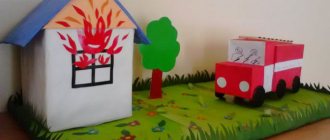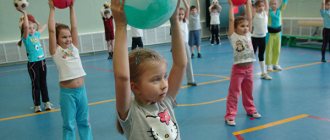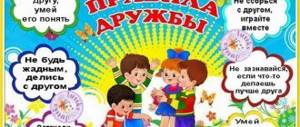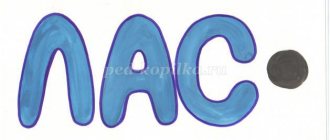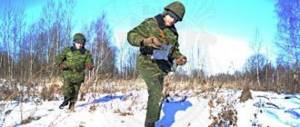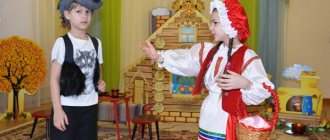Speech therapist lesson in the preparatory group “Island of Lost Words”
Educational areas: “Communication”, “Cognition”, “Health”, “Socialization”.
Recommended number of children: 5-6 people with speech conclusion “Dislalia”.
Goal: Automation of the sound [r] in syllables, words, sentences.
Tasks:
- Correctional and educational:
- Fix the auditory and motor image of the sound “R”.
- Strengthen the ability to analyze the articulation of sound and characterize it using a plan diagram.
- Automate the sound “R” in isolation, in syllables, words, verses.
- Strengthen the ability to form words from letters and perform sound analysis of words.
- Strengthen the ability to select words to rhyme.
- Strengthen the ability to solve puzzles and puzzles.
- Develop skills in reading words using cards.
- Correctional and developmental:
- Develop articulatory motor skills using articulatory gymnastics.
- Develop phonemic hearing and perception.
- Develop a sense of rhythm.
- Develop fine motor skills.
- Develop thinking processes.
- Correctional and educational:
- Cultivate the desire to speak correctly and beautifully.
- Encourage children to be active and attentive in class.
Preliminary work: sound production, automation in syllables, words, short phrases, work with parents (homework in individual notebooks).
Equipment.
Demonstration: screen, projector, map, notes, puzzles, key, bottle, tree, 2 barrels, box, meadow carpet, stereo system, pirate costume.
Handout: cards with unfinished letters, laces for laying out letters, Su-jok massage balls, pirate pens, chocolate coins.
Move
A speech therapist dressed in a Pirate costume comes in and reads the map.
Pirate.
Many years ago a treasure was buried here. You get to the island, find this treasure!
- Hi guys! I came across a pirate map. I really want to find the treasure! But I don’t know where to look, where to go? Look, there is something written here: “The treasure is on the Island of Lost Words. If you can find all the words, you will find the treasure.” Help me find the treasure. Will you be my team?
Children. Yes.
Pirate. I don’t know what kind of Island of Lost Words this is. What is a word? What parts does it consist of? What are the syllables made of?
Pirate. Guys, do you know how to pronounce the most difficult sound correctly?
Children. [r – r – r – r-…].
Pirate. Tell us how to pronounce it correctly (children talk about the articulation of the sound [p] and give a description of the sound ).
Children. The lips are smiling; teeth are open; the tip of the tongue is raised onto the alveoli, the lateral edges are pressed against the teeth, when a strong air comes out, the tip of the tongue trembles; vocal cords are working.
— What can you tell us about the sound “R”, what is it like?
Children: The sound “R” is a consonant (because the air stream meets an obstacle), voiced (the vocal cords are working), hard (the back of the tongue is lowered).
Pirate. Well done! To become a real pirate you must take an oath of allegiance. An oath is a promise that cannot be broken.
Oath:
I swear to always speak correctly and beautifully! I swear! I swear to help my comrades! I swear! I swear to be brave and courageous! I swear! I swear to be cheerful! I swear! I swear to be a real pirate! I swear!
Let's go on a journey to look for the Island of Lost Words. We board the ship and set sail (on the screen there is a slide “Pirate ship”).
Breathing exercises
(children repeat all movements after the Pirate)
Children sit down, put their palms on their knees, bend forward - inhale, straighten up - long exhale.
(Audio recording of a song from the film About Little Red Riding Hood - Uninhabited Island by Yu. Mikhailov, music by A. Rybnikov A., slide “Island”).
Pirate. I see an island, we disembark from the ship. Before looking for treasure on the Island of Lost Words, we need to train our tongue.
Articulation gymnastics
We smile at the frogs, pulling our lips straight to our ears. We will close our teeth and immediately open them.
We dig for worms, We dig with our tongue, we raise our tongue to the sky and we get a mushroom.
The woodpecker taps and taps with its nose, We hear a cheerful sound - d-d-d...
Pirate. Let's look on the map where to go next. This is a mountain of Complex syllables. If we name all the syllables correctly, we will be able to climb it (slide “Mountain of Complex Syllables”).
Ra-ra-ra, ra-ra-ra, It’s time for us all to speak! Ru-ru-ru, ru-ru-ru, We climbed the mountain!
Ry-ry-ry, ry-ry-ry, Oh, we fell off the mountain! Re-re-re, re-re-re, Finally we are on the mountain!
Pirate. We set off further on our journey. According to the map, we need to follow to Lake Tranquility. (Music “Sounds of Nature - Forest Singing”, slide “Lake”) Listen to how wonderful the birds sing! Let's sit, listen to the birds singing, and play with prickly balls.
Game with massage balls "Su-jok"
I squeeze the ball tightly and change my palm. My ball does not rest It walks across the palms of my hands.
I boldly roll in circles, I don’t let go from under my arms. I swing it back and forth, right and left - as I want.
Each finger can dance on the ball. I’ll hold it between my fingers and put it in my palm.
I’ll take it out of my hand and place it on the right or left. My ball is friends with my hand - What a magician I am!
Pirate. Guys, look for a hint on what we should do next. I found a note! (reads the note).
- Let's make up the word “friendship” from these unusual stones (children make up a word from stones with the word “friendship” written on them)
Pirate. Tell me, how many sounds are in the word “friendship”? (The word “friendship” has 6 sounds) Name each sound in order. How many vowel sounds? (The word “friendship” has 2 vowel sounds) How many consonants? (This word has 4 consonants)
Guys, now, in order to continue looking for the treasure together, let’s repeat a real pirate chant. Repeat after me.
Physical school
Wow! - Wow! - Wow-wai! Wow! - Wow! Wow-wai! (we jerk our right arms up several times)
Wow-wow-wow! - Wow-wow-wo! (we raise our left hands up several times with jerks) Chiki-riki-lumba! - Chiki-riki-lumba! (place their right hand on their hip) Rumba la Columba! - Rumba la Columba! (place left hand on hip) Aba-raba-kurarez! - Aba-raba-kurarez! (we place our right hand on our left shoulder) Kiris Ramba Dominez! - Kiris Ramba Dominez! (we place our left hand on our right shoulder) Shirley-myrley carabas! - Shirley-myrley karabas! (rotate with hands folded on shoulders) Bala amba arras! - Bala amba arras! (put your palms on your knees and slightly squat and straighten up) Jinga-ringa kvista tsk-tsk-tsk! - Ginga-ringa kvista ts-ts-ts- (put their palms on their knees and alternate them) We guys are great! - We are great guys! (all children extend their arms forward and join them all together in a clap)
- Hooray! Let's go look for the treasure!
Pirate. Where will we go on the map? We must find a bottle, and there is a message in the bottle (read the letter and complete the task)
Pirate. Guys, what should we find on the map?
Children. We must find a clearing.
- Hurray, we found it! (slide “clearing with flowers”)
Pirate. Guys, do you know any poems that are… unusual? And I also know poems, but you have to help me tell them.
The sounds were unable to do anything, They were tired of idleness. They got tired of being bored and went to play mischief.
What a laugh... "R" fell on the cat. The cat is not a cat now, but... (mole).
“K” in the pocket to the fitter - jump, And in the pocket there are rollers. At the same moment Jumped out of my pocket... (rabbits).
The letter “D” at the bottom of the pond was found by crayfish. Since then they have been in trouble: Every now and then... (fights)
Pirate. There's some kind of note here. Using strings, lay out the unfinished letters. What letters did you get? Read the words.
Pirate. We must find the key on the map.
Children. Found, the key is hanging on a hook, and there is also a letter (they read the letter)
Pirate. Words are hidden here. What is this? How to guess?
Children. These are puzzles (children solve puzzles and pronounce the resulting tongue twister).
Pirate. Guys, where to go next on the map? (to the barrels) Look, here's a note.
Children. Behind, a treasure, a spreading, tree, hidden.
Pirate. An unclear proposal. Where is the treasure hidden? How should I say it?
Children. The treasure is hidden behind a spreading tree.
Pirate. How many words are there in this sentence?
Children. Here it is - a tree, and here is a treasure. (They take out the box and open it.)
Pirate. Oooh, I thought there were gold coins there...
Children. These are pens.
Pirate. What are they needed for?
Children. Pens are needed to write.
Pirate. So this is a real treasure, let’s spell the words correctly. What did we find on the Island of Lost Words? (sounds, letters and words) What is the most difficult sound you taught me to pronounce correctly? (R sound) Did I pronounce it correctly?
Pirate. Guys, they are waiting for you in the group, let's go back. We board the ship and set sail (slide “Island”, children sit down)
Breathing exercises
Children put their hands on their knees, bend forward - inhale, straighten up - long exhale. (Audio recording of a song from the film About Little Red Riding Hood - Uninhabited Island by Yu. Mikhailov, music by A. Rybnikov A., slide “Island”).
Pirate. Guys, take these coins from me as a gift. Goodbye! When I find another card, I will definitely invite you.
Author: Garmatina Natalya Aleksandrovna Position: teacher-speech therapist Place of work: MBDOU TsRR kindergarten No. 35 “Fairy Tale” Location: Sverdlovsk region, Verkhnyaya Tura city
How to conduct a speech hour in a preparatory speech therapy group
Speech therapy songs for children are an excellent way to develop speech. The baby gets involved in the game and strives to pronounce syllables better and better in order to sing the words completely, repeating them after the teacher and other children.
Songs in the kindergarten.
To conduct a speech hour in a preparatory speech therapy group, the teacher prepares in advance. For the lesson you will need:
- tape recorder and cassette tape;
- card index with song options;
- methodological publication for teachers.
Additional Information! In modern preschool educational institutions, speech correction classes are conducted using interactive technologies. These can be boards, special tables, computers, tape recorders.
Interactive technologies for conducting speech therapy classes
The lesson is held in the format of a game, tasks are given by a speech therapist, the development of higher mental functions and speech occurs when all requirements are met. The children's classroom for classes at the preschool educational institution is equipped with the following equipment:
- interactive board;
- software and didactic complex;
- stands;
- interactive computerized complex;
- tape simulator.
Complex in the garden for speech development
Important! A home lesson will not bring as much benefit as a group lesson at a preschool using special equipment. The teacher works with the kids according to an approved program, chooses a certain animal, for example, a goat, and invites the children to sing about it.
An example of a subgroup speech therapy lesson in a preparatory group
A subgroup speech therapy lesson in a preschool educational institution is conducted according to a predetermined scheme. The following tasks must be completed:
- development of articulation and motor skills;
- spatial orientation;
- development of thinking and memory;
- drawing up complete proposals.
Progress of the lesson:
- Identification of a group of children with the same speech impairments.
- Explanation of the topic, selection of sounds for correction: zh, sh, s, z.
- Studying visual materials, cards.
- A short presentation with cartoon clips.
- Listen to songs online.
- Repeating words after the teacher and speaker.
At the end of the lesson, to consolidate the result, children perform a speech exercise proposed by the teacher.
Frontal speech therapy sessions
If a child needs correctional work on sounds and pronunciation, he attends separate, frontal classes. During these lessons, speech therapy cubes for speech development and cassettes with recordings of musical compositions are used.
A frontal lesson gives the child the opportunity to speak independently, not surrounded by a group. He listens attentively to the text being read, and then retells it, explaining how he understood the meaning.
Important! Frontal classes are necessary for the formation of grammatically correct pronunciation, vocabulary, coherent, meaningful speech.
Music at such hours serves only as an addition to the main program. Sometimes five lessons are enough to correct the situation, but in exceptional cases the teacher works with the child for more than one month.
Producing vowel sounds in children
Conducting and organizing speech therapy quizzes for preschoolers
All participants are divided into several groups. Each team prepares its own motto and uniform.
Quiz progress:
- The teacher reads out a greeting and offers tasks that the children must complete.
- A mini-scene from the book is played out.
- Physical warm-up by humming a children's song.
Parents can be involved in the quiz. Together with their children, they repeat tongue twisters and nursery rhymes.
Art therapy in speech therapy
Art therapy is used in correctional work; drawing in speech therapy is one of the ways to quickly correct a difficult situation.
Types of art therapy:
- modeling;
- drawing;
- music therapy;
- choreography;
- photographing;
- sand therapy.
Creative activity is not similar to ordinary group classes; the child relaxes and allows the speech pathologist to carry out correctional work.
If there are serious speech impairments, then it is advisable to use a combination of methods: vocals, art therapy, drawing, participation in theatrical productions. An active child undergoes correction faster and begins to speak correctly.
